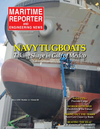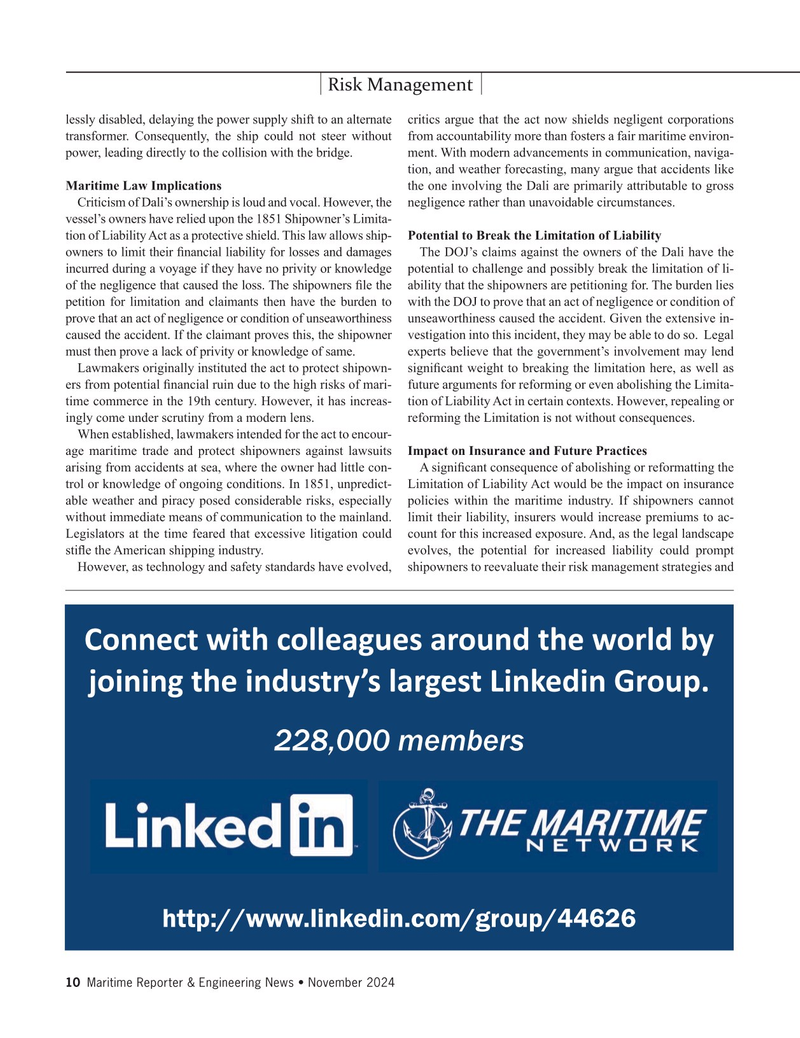
Page 10: of Maritime Reporter Magazine (November 2024)
Read this page in Pdf, Flash or Html5 edition of November 2024 Maritime Reporter Magazine
Risk Management lessly disabled, delaying the power supply shift to an alternate critics argue that the act now shields negligent corporations transformer. Consequently, the ship could not steer without from accountability more than fosters a fair maritime environ- power, leading directly to the collision with the bridge. ment. With modern advancements in communication, naviga- tion, and weather forecasting, many argue that accidents like
Maritime Law Implications the one involving the Dali are primarily attributable to gross
Criticism of Dali’s ownership is loud and vocal. However, the negligence rather than unavoidable circumstances.
vessel’s owners have relied upon the 1851 Shipowner’s Limita- tion of Liability Act as a protective shield. This law allows ship- Potential to Break the Limitation of Liability owners to limit their ? nancial liability for losses and damages The DOJ’s claims against the owners of the Dali have the incurred during a voyage if they have no privity or knowledge potential to challenge and possibly break the limitation of li- of the negligence that caused the loss. The shipowners ? le the ability that the shipowners are petitioning for. The burden lies petition for limitation and claimants then have the burden to with the DOJ to prove that an act of negligence or condition of prove that an act of negligence or condition of unseaworthiness unseaworthiness caused the accident. Given the extensive in- caused the accident. If the claimant proves this, the shipowner vestigation into this incident, they may be able to do so. Legal must then prove a lack of privity or knowledge of same. experts believe that the government’s involvement may lend
Lawmakers originally instituted the act to protect shipown- signi? cant weight to breaking the limitation here, as well as ers from potential ? nancial ruin due to the high risks of mari- future arguments for reforming or even abolishing the Limita- time commerce in the 19th century. However, it has increas- tion of Liability Act in certain contexts. However, repealing or ingly come under scrutiny from a modern lens. reforming the Limitation is not without consequences.
When established, lawmakers intended for the act to encour- age maritime trade and protect shipowners against lawsuits Impact on Insurance and Future Practices arising from accidents at sea, where the owner had little con- A signi? cant consequence of abolishing or reformatting the trol or knowledge of ongoing conditions. In 1851, unpredict- Limitation of Liability Act would be the impact on insurance able weather and piracy posed considerable risks, especially policies within the maritime industry. If shipowners cannot without immediate means of communication to the mainland. limit their liability, insurers would increase premiums to ac-
Legislators at the time feared that excessive litigation could count for this increased exposure. And, as the legal landscape sti? e the American shipping industry. evolves, the potential for increased liability could prompt
However, as technology and safety standards have evolved, shipowners to reevaluate their risk management strategies and
Connect with colleagues around the world by joining the industry’s largest Linkedin Group.
228,000 members http://www.linkedin.com/group/44626 10 Maritime Reporter & Engineering News • November 2024
MR #11 (1-17).indd 10 10/25/2024 12:15:17 PM

 9
9

 11
11
